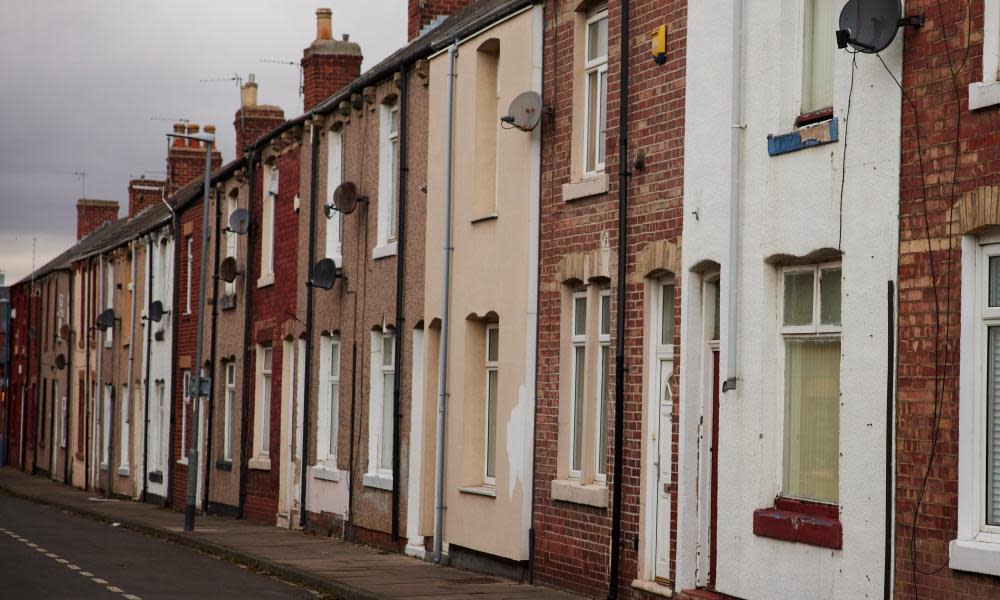Asylum seekers in UK to lose basic housing protections in move to cut hotel use

Ministers are removing basic housing protections from asylum seekers under new rules designed to move tens of thousands out of hotels and into the private rented sector.
The changes would exempt landlords from regulations governing everything from electrical safety to minimum room sizes, leading campaigners to warn that the government is preparing to cram people into small spaces in an effort to alleviate the crisis in asylum seeker accommodation.
MPs are set to vote as soon as Wednesday on the plans, which have been put forward by Suella Braverman, the home secretary, and Michael Gove, the housing secretary.
Under the changes, landlords of asylum seekers in England and Wales would no longer have to register with local authorities. The rules would allow landlords to house asylum seekers for two years without obtaining a House in Multiple Occupation (HMO) licence, a standard requirement for any landlord renting to more than one household in a single property.
Mary Atkinson, a campaigns and network manager at the Joint Council for the Welfare of Immigrants, said: “HMO licences exist to make sure that accommodation meets basic levels of safety and sanitation. However, much asylum accommodation already falls below these standards, with people seeking sanctuary housed in cramped, windowless rooms smaller than prison cells.
“Without HMO licences, already traumatised people will be at risk of living in places that are unfit for human habitation.”
Gove is pushing the rules through the Commons at the request of Braverman as the government scrambles to reduce the number of people being temporarily housed in hotels. He plans to bring them to a vote in the Commons with little fanfare on a day that will otherwise be dominated by the publication of his bill to ban landlords from evicting tenants without cause.
Massive backlogs in the asylum processing system have led to more than 50,000 asylum seekers being housed in hotels across the country, at a cost of £6m a day. Meanwhile, cramped and unsanitary conditions in temporary accommodation have led to outbreaks of highly contagious diseases such as diphtheria.
The temporary solutions have caused alarm among healthcare workers and migration campaigners. But they have angered a number of Conservative MPs, who say they are putting pressure on local communities and services.
Braverman is already planning to house asylum seekers on redundant cruise ships, barges and ferries in an effort to ease the crisis. Meanwhile, Rishi Sunak is using a meeting of the Council of Europe in Iceland to lobby his European counterparts to reduce the ability of the European court of human rights to block asylum seeker deportations.
Ministers hope that removing housing regulations for private landlords will also speed up the transfer of people away from hotels.
A government spokesperson said: “By temporarily removing this licensing requirement, we will be able to acquire more suitable long-term accommodation while continuing to meet our legal duty of care.”
The abolition of the rules means that landlords of asylum seekers, many of whom use large service companies such as Serco to run their properties, will no longer have to provide gas or electrical safety certificates before tenants move in.
They will not be asked to supply documents on demand to show that electrical appliances and furniture are safe and usable. And they will not have to comply with standards that require under-10s to have a room at least 4.6 sq metres and over-10s to a room of at least 6.5 sq metres.
Polly Neate, the chief executive of Shelter, said: “Licensing for HMOs was brought in to keep people safe. By doing away with these protections in order to flex minimum space standards, the government is putting thousands of people, including children and older people, at serious risk.”
Braverman used a speech to the National Conservatism conference this week to argue for lower migration, despite pressure from some of her cabinet colleagues to allow more people to come to the UK to boost the economy.
Gove gave the home secretary his backing on Tuesday, telling the same conference that migration was a key reason for the UK’s housing crisis – despite evidence that his own watering down of housing targets is set to drive housebuilding to the lowest level in decades.
Gove said: “Britain’s always been a country that has benefited from people of talent arriving here and people fleeing persecution, but the numbers recently have been at a level where there’s an inevitable pressure on housing and on public services.”
The changes explained
What is a HMO? A house in multiple occupation is any home rented out to three or more tenants from more than one household. This applies whether it is a house or a block of flats, and requires landlords to register with their local council.
What are the licensing requirements? Landlords renting out an HMO must provide:
A gas safety certificate every year.
Working smoke alarms for every inhabited storey.
If requested, a declaration that electrical appliances and furniture are safe.
Written statement of the terms of occupancy to tenants.
A carbon monoxide alarm in every inhabited room with a gas or oil heater.
A declaration from a qualified electrician that electrical fittings are safe.
Bedrooms that are at least:
– 6.51 sq metres for a room used by one person aged 10 or over.
– 10.22 sq metres for a room used by two persons aged 10 years or over.
– 4.64 sq metres for a room used by one person aged under 10 years.
What will the new rules mean? The government will still have some oversight of landlords who rent to asylum seekers, because civil servants will sign off on their contracts. But campaigners say the Home Office has already proved it is unable to provide safe and sanitary asylum accommodation, after outbreaks of diphtheria at hotels and the Manston holding facility in Kent.

 Yahoo News
Yahoo News 
